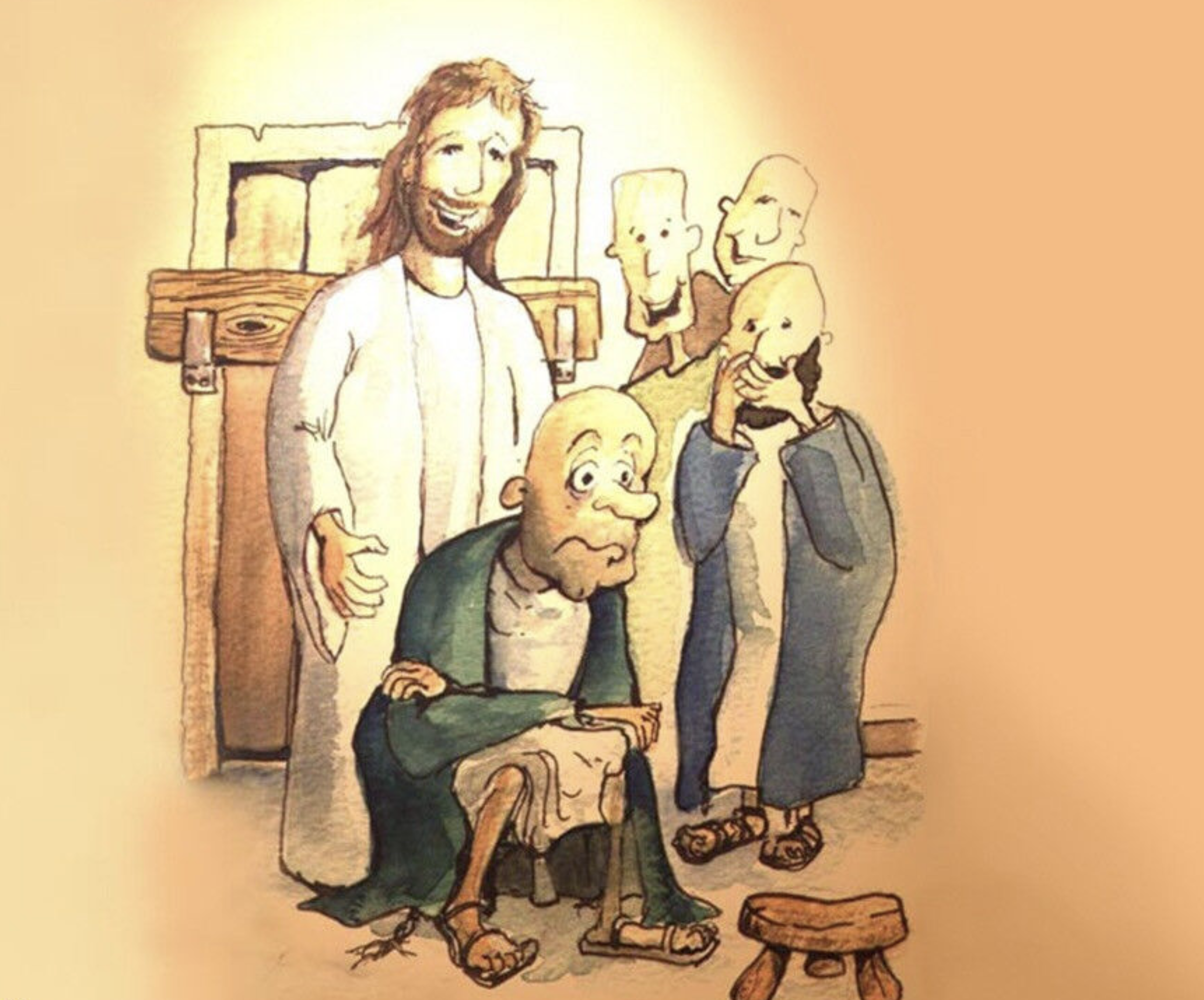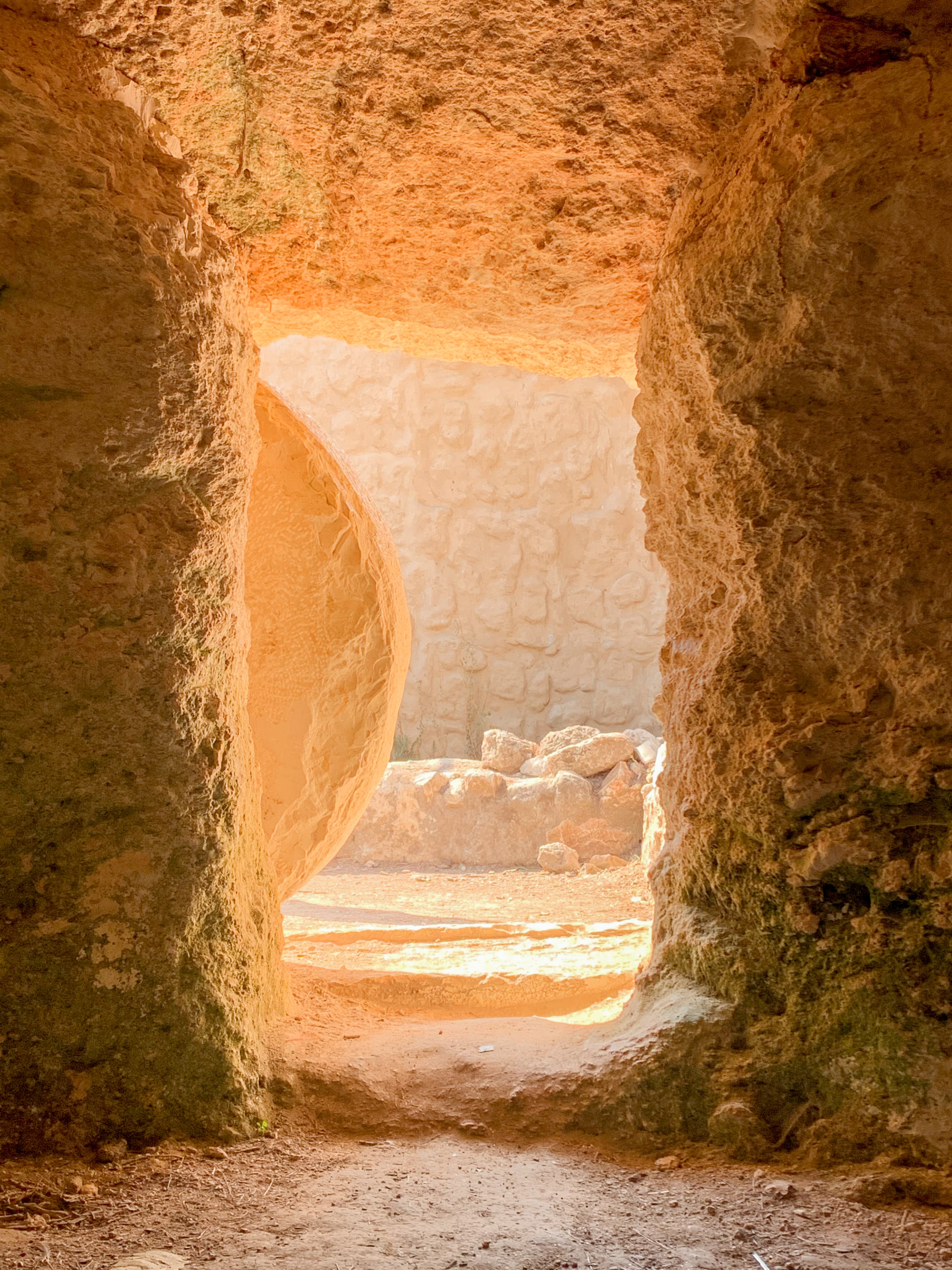
Holy Week is one of reflection. What of that pain in Gethsemane, the word meaning pressing, the pressure that Jesus had to bear? The horrific tragedy of Good Friday and then the silence of Saturday, before the unbelief of the Resurrection. The women who came to that tomb early that morning only expecting to tend to the dead body. But they had such news to now give to others! How might it be received? What would have been our response?
What would have been our response?
A question upon reflection of John 20:19-31

In John’s Gospel account of the Resurrection, we have Mary who finds that empty tomb. She runs back, in a state of shock? to find Simon and the disciple that Jesus loved (?). There is that foot race in which Simon comes a clear second, possibly showing his age, but then immediately runs into the tomb. Was this casting all fear aside or because he was so desperate to meet with Jesus once again. He had denied Jesus three times a few days earlier, been referred to as Satan at the meal the night before Passover – he may well have been so desperate. Once they discern that Jesus is not there they return to their locked upper room, where the disciples are holding out.
Mary’s reponse
Mary, beside herself in anguish, turns to the other man in the garden, the garden where the tomb was situated.
Odd that Jesus was arrested in a garden and returns in a garden.
As this man speaks Mary recognises it is Jesus. Have we found that when we have called someone, before we can even announce “Hi it’s…” the other person has responded. It’s near instantaneous, the speed we can recognise a voice. I understand from my days flying that the human brain can process many audio inputs at the same time, discerning which is more important to listen to, enabling that processing. Here, we immediately knew it was Jesus’ voice. Do we, when we pray, know of that voice? You know, when people say “I heard God’s voice“, what does it sound like? How did they know?
Mary runs off to the disciples again, in their locked room, and declares that Jesus has risen, “I have seen the Lord“. She’s certain. It’s a pivotal moment for her.
Are we prepared to stay within the sanctuary, the church building, or are we the church without walls, leaving, being sent?
Day 1
If Mary saw Jesus first thing in the morning after the Sabbath, it’s been a long day as evening starts to arrive. The confusion, the heated discussions amongst the disciples must have been on handoff throughout the day. Then, Jesus appears: “Peace be with you“.
Do you recall – I say recall as it may have been some time since people last said this in Church – when people turn to each other and say “The Peace”. It can appear to those whom don’t come to Church very often like some magical statement after which someone smiles at you, or worse if you are an introvert, you get hugged. There’s little introduction or warning of what might happen. It’s odd that really as this isn’t a greeting. And it is linked to the disciples being sent.
The Peace that Jesus gives to the disciples is one of calm, one of assurance.
Look
Jesus is keen to show that he’s real. We don’t see Lazarus described after he came back to life, other than wrapped in burial clothes, but by now he’s out and about possibly. Many of the crowd who joined Jesus in his arrival into Jerusalem came direct from Lazarus’ return. Jesus shows his hands and his side – no one asks him to do this. It’s a bit like Show and Tell at school. The wounds are still very much evident, possibly not for the faint at heart. So are we to infer that our resurrection bodies are also not wound free? Are the abilities we have today, the same as we may have later? Paul, in his letter to the Corinthians, discusses mentions this briefly.
What would have been our response if Jesus showed us his wounds?
The disciples rejoice seeing Jesus – no mention of the wounds. Receive the Holy Spirit, the Paraclete.
What would have been our response?
The disciples are not recorded showing any response. (?) This isn’t the Pentecost we were expecting. Just as Jesus had done to so many, to the annoyance of the Pharisees, he informs his disciples that “if you forgive the sins of any, they are forgiven them” – the onus is upon the one who sins.
Thomas
Thomas has been where? He was one of the twelve, although previously known as Judas (different one), and here is called both Thomas and Didymus, both of which mean twin.
We call him ‘Doubting Thomas’ – not Scripture. Some might call him Driven or Seeking Thomas.
Thomas was with Jesus when Lazarus came back to life. Note that he has not received the Holy Spirit – nope, he was missing when that happened. Returning to ‘doubt’ for a moment. Is doubt really that bad? It makes us stop, pause, ponder…think. It isn’t just ignoring the issue. Doubt can lead to good.
Thomas is rapidly informed by the others of what they had seen, which must have included a description of the wounds, for that is what Thomas wishes to see. It is more of an ultimatum otherwise “I will not believe“.
Do we have conditions we set prior to believing? What might have those conditions prevented us from doing?
A week later – a week! – Thomas is this time with the other disciples when Jesus appears and yet again offers “Peace be with you”. Again it may not be a greeting as we presume, unless the minister or the one presiding has suddenly appeared from nowhere. Stoffregen suggests an alternative “the ‘peace’ of the kingdom is not primarily a personal, inner tranquility, but the way people and all creation and God will relate to each another — a harmonious existence.” Jesus immediately asks Thomas to examine the wounds – to which Thomas immediately cries out “The Lord of Me and the God of me” (from the Greek).
What are we to make of this today?
Thomas the doubter? Thomas doubted the ones who had seen the newly resurrected Christ, the wounds which were still fresh, open. His immediate response to Jesus, not acknowledging that he was a Rabbi or a Teacher but Lord and God, shows that Thomas had no doubt whatsoever. So where is the doubt?
The disciples had secured themselves in a room, probably for a good reason. When the Gospel of John was written the Romans had already ransacked the Temple in Jerusalem, and any semblance of understanding with the followers of Jesus had long waned. But their Messiah had returned. OK the disciples had never believed the women, and then when Jesus had entered their room, they saw, but that belief didn’t last long – because the room was still locked a week later. Hope they got deliveries back then.
Perhaps this message is about the longevity of faith. We can all get spiritual highs: from music, of a church service, from attending a christian festival (if we can remember that far back) – but our faith journey continues each and every day. The disciples had seen with their very eyes but had let their faith diminish. Just as the followers who had escorted Jesus into Jerusalem on ‘Palm Sunday’ had dissipated into the crowds during that final week. The disciples had been given a task, they were sent, but had preferred to hole up for a while.
Are we prepared to stay within the sanctuary, the church building, or are we the church without walls, leaving, being sent?
What’s our response to this? What might we want to say to God now? Continue this conversation with God throughout the day.
Cover image (c) Rev Henry Martin, used with permission

